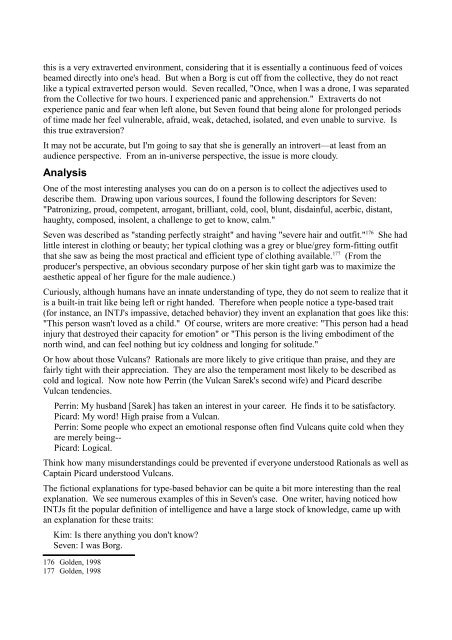Create successful ePaper yourself
Turn your PDF publications into a flip-book with our unique Google optimized e-Paper software.
this is a very extraverted environment, considering that it is essentially a continuous feed of voices<br />
beamed directly into one's head. But when a Borg is cut off from the collective, they do not react<br />
like a typical extraverted person would. Seven recalled, "Once, when I was a drone, I was separated<br />
from the Collective for two hours. I experienced panic and apprehension." Extraverts do not<br />
experience panic and fear when left alone, but Seven found that being alone for prolonged periods<br />
of time made her feel vulnerable, afraid, weak, detached, isolated, and even unable to survive. Is<br />
this true extraversion?<br />
It may not be accurate, but I'm going to say that she is generally an introvert—at least from an<br />
audience perspective. From an in-universe perspective, the issue is more cloudy.<br />
Analysis<br />
One of the most interesting analyses you can do on a person is to collect the adjectives used to<br />
describe them. Drawing upon various sources, I found the following descriptors for Seven:<br />
"Patronizing, proud, competent, arrogant, brilliant, cold, cool, blunt, disdainful, acerbic, distant,<br />
haughty, composed, insolent, a challenge to get to know, calm."<br />
Seven was described as "standing perfectly straight" and having "severe hair and outfit." 176 She had<br />
little interest in clothing or beauty; her typical clothing was a grey or blue/grey form-fitting outfit<br />
that she saw as being the most practical and efficient type of clothing available. 177 (From the<br />
producer's perspective, an obvious secondary purpose of her skin tight garb was to maximize the<br />
aesthetic appeal of her figure for the male audience.)<br />
Curiously, although humans have an innate understanding of type, they do not seem to realize that it<br />
is a built-in trait like being left or right handed. Therefore when people notice a type-based trait<br />
(for instance, an INTJ's impassive, detached behavior) they invent an explanation that goes like this:<br />
"This person wasn't loved as a child." Of course, writers are more creative: "This person had a head<br />
injury that destroyed their capacity for emotion" or "This person is the living embodiment of the<br />
north wind, and can feel nothing but icy coldness and longing for solitude."<br />
Or how about those Vulcans? Rationals are more likely to give critique than praise, and they are<br />
fairly tight with their appreciation. They are also the temperament most likely to be described as<br />
cold and logical. Now note how Perrin (the Vulcan Sarek's second wife) and Picard describe<br />
Vulcan tendencies.<br />
Perrin: My husband [Sarek] has taken an interest in your career. He finds it to be satisfactory.<br />
Picard: My word! High praise from a Vulcan.<br />
Perrin: Some people who expect an emotional response often find Vulcans quite cold when they<br />
are merely being--<br />
Picard: Logical.<br />
Think how many misunderstandings could be prevented if everyone understood Rationals as well as<br />
Captain Picard understood Vulcans.<br />
The fictional explanations for type-based behavior can be quite a bit more interesting than the real<br />
explanation. We see numerous examples of this in Seven's case. One writer, having noticed how<br />
INTJs fit the popular definition of intelligence and have a large stock of knowledge, came up with<br />
an explanation for these traits:<br />
Kim: Is there anything you don't know?<br />
Seven: I was Borg.<br />
176 Golden, 1998<br />
177 Golden, 1998




